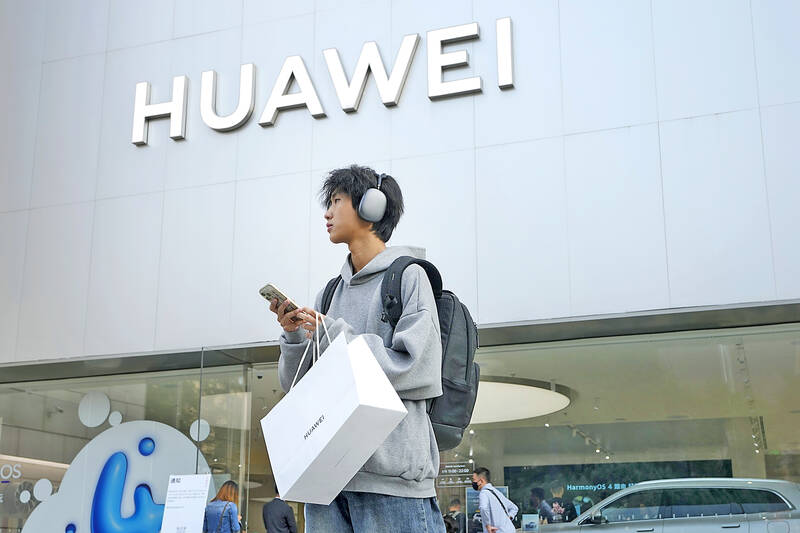The US might not be able to stop Chinese firms, including Semiconductor Manufacturing International Corp (SMIC, 中芯) and Huawei Technologies Co (華為), from making progress in chip technology, one of the semiconductor industry’s leading figures said this week.
SMIC and Huawei, which stunned Washington by unveiling a made-in-China phone processor, can use existing older machines to make even more sophisticated silicon, former Taiwan Semiconductor Manufacturing Co (TSMC, 台積電) vice president Lin Burn-jeng (林本堅) said.
SMIC should be able to advance to 5-nanometer technology with ASML Holding NV machines that it already operates, said Lin, who at TSMC championed the lithography technology that transformed chipmaking.

Photo: AP
Huawei electrified the chip industry when it unveiled a 7-nanometer processor made by SMIC in the Mate 60 Pro, triggering celebrations in China and accusations in the US that a campaign to contain the country’s tech ascent had failed.
Yangtze Memory Technologies Co (長江存儲) is also producing some of the most advanced memory chips in the industry.
The administration of US President Joe Biden this month tightened curbs to close loopholes through which China might be accessing advanced US equipment, marking a new phase in a struggle to influence technologies crucial to the economic and political balance.
Yet that might not stop China’s technological ascent, said Lin, who is highly regarded in the industry for being the first person to propose immersion lithography, the technology that ASML’s core products rely on.
SMIC used ASML’s immersion lithography machines to make the 7-nanometer chip for Huawei, Lin said.
Beyond trying to reach the 5-nanometer milestone, it is likely that China would experiment with new materials or advanced chip packaging to make more powerful semiconductors, he said.
“It is just not possible for the US to completely prevent China from improving its chip technology,” Lin said in an interview at National Tsing Hua University in Hsinchu City, where he serves as dean of the semiconductor research college.
That echoed comments from Arm Holdings PLC chief executive officer Rene Haas earlier this month.
“What the US really should do is to focus on maintaining its chip design leadership instead of trying to limit China’s progress, which is futile, as China is adopting a whole-nation strategy to boost its chip industry, and hurting the global economy,” Lin said.
The US might have inadvertently granted Shanghai-based SMIC a golden opportunity, he added.
In 2020, Washington effectively banned TSMC — supplier of the world’s most advanced silicon to Apple Inc and Nvidia Corp — from doing business with Huawei.
That is when SMIC stepped up to inherit the massive orders that helped it to improve its manufacturing technique, Lin said.
A debate is now raging in the US and beyond about whether Washington and its allies should step up their Chinese containment campaign.
US Secretary of Commerce Gina Raimondo has said Washington does not have evidence that China can make advanced chips “at scale.”
US Under-Secretary of Commerce for Industry and Security Alan Estevez said it is “absolutely” a concern for Washington that China could use 7-nanometer technology — or better — in military applications.

To many, Tatu City on the outskirts of Nairobi looks like a success. The first city entirely built by a private company to be operational in east Africa, with about 25,000 people living and working there, it accounts for about two-thirds of all foreign investment in Kenya. Its low-tax status has attracted more than 100 businesses including Heineken, coffee brand Dormans, and the biggest call-center and cold-chain transport firms in the region. However, to some local politicians, Tatu City has looked more like a target for extortion. A parade of governors have demanded land worth millions of dollars in exchange

An Indonesian animated movie is smashing regional box office records and could be set for wider success as it prepares to open beyond the Southeast Asian archipelago’s silver screens. Jumbo — a film based on the adventures of main character, Don, a large orphaned Indonesian boy facing bullying at school — last month became the highest-grossing Southeast Asian animated film, raking in more than US$8 million. Released at the end of March to coincide with the Eid holidays after the Islamic fasting month of Ramadan, the movie has hit 8 million ticket sales, the third-highest in Indonesian cinema history, Film

BIG BUCKS: Chairman Wei is expected to receive NT$34.12 million on a proposed NT$5 cash dividend plan, while the National Development Fund would get NT$8.27 billion Taiwan Semiconductor Manufacturing Co (TSMC, 台積電), the world’s largest contract chipmaker, yesterday announced that its board of directors approved US$15.25 billion in capital appropriations for long-term expansion to meet growing demand. The funds are to be used for installing advanced technology and packaging capacity, expanding mature and specialty technology, and constructing fabs with facility systems, TSMC said in a statement. The board also approved a proposal to distribute a NT$5 cash dividend per share, based on first-quarter earnings per share of NT$13.94, it said. That surpasses the NT$4.50 dividend for the fourth quarter of last year. TSMC has said that while it is eager

‘IMMENSE SWAY’: The top 50 companies, based on market cap, shape everything from technology to consumer trends, advisory firm Visual Capitalist said Taiwan Semiconductor Manufacturing Co (TSMC, 台積電) was ranked the 10th-most valuable company globally this year, market information advisory firm Visual Capitalist said. TSMC sat on a market cap of about US$915 billion as of Monday last week, making it the 10th-most valuable company in the world and No. 1 in Asia, the publisher said in its “50 Most Valuable Companies in the World” list. Visual Capitalist described TSMC as the world’s largest dedicated semiconductor foundry operator that rolls out chips for major tech names such as US consumer electronics brand Apple Inc, and artificial intelligence (AI) chip designers Nvidia Corp and Advanced